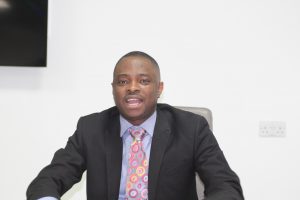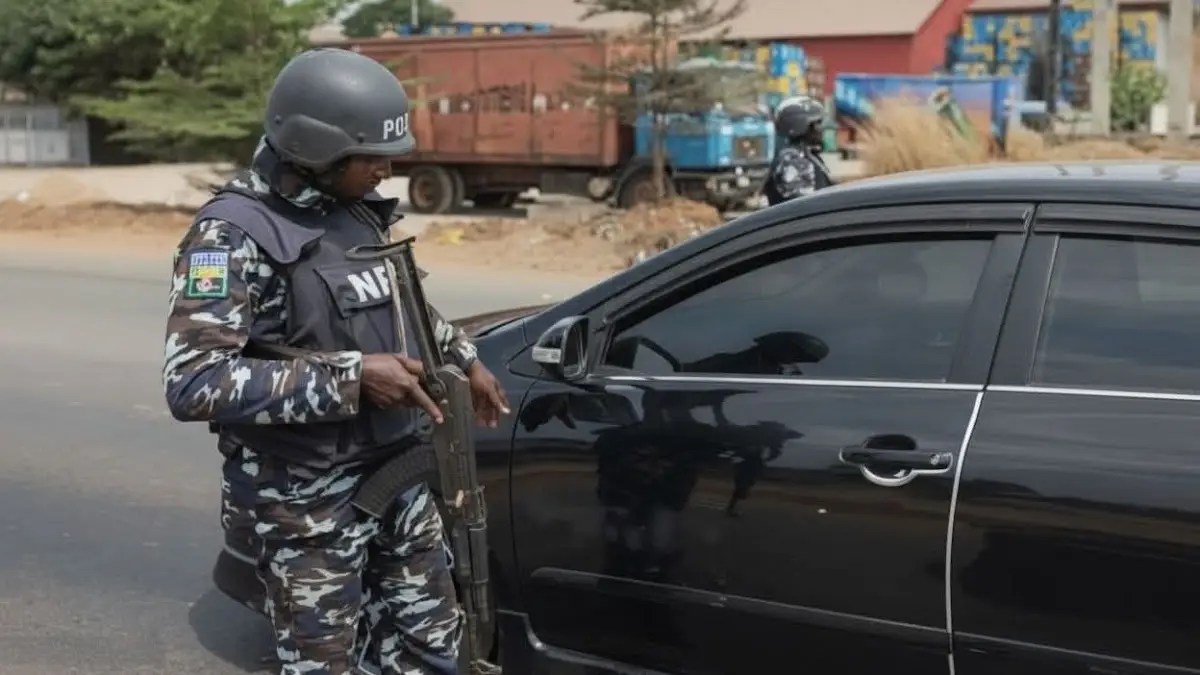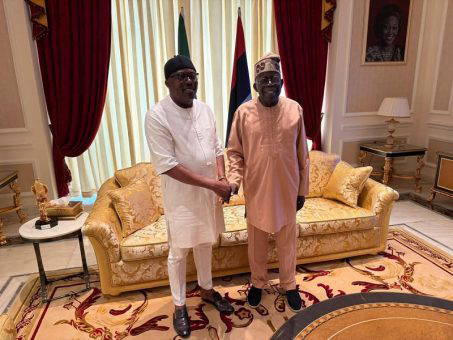News
Who Can Be Trusted When Fake Groups Defend Nigeria’s ‘Most Abusive and Corrupt Officials’

By Joel Popoola
“On the internet, nobody knows that you’re a dog”.
So went the caption of one of the internet’s first ever memes, American cartoonist Peter Steiner’s iconic 1993 cartoon of a dog using a computer.
In those days, the message was empowering – the digital age allows you to create an entirely different persona online, expressing yourself in a way which was previously impossible.
But today people claiming to be something they aren’t, potentially threatens Nigerian democracy.
The international cliché of the “Nigerian Prince” online scammer is at best a grotesque symbol of our national squandering of a creative and digitally-confident youth, and at worst a national embarrassment.
But Nigeria increasingly has a similar problem at home, with the troubling rise of new public groups who are also not who they claim to be – and who exist only to mislead.
Global think tank, Carnegie, have recently released research highlighting the rise of “at least 360” new non-governmental organisations in Nigeria who “masquerade as authentic civil society groups, singing the praises of top officials and attacking their critics.”
The researchers state that these groups have created “a substantial fake civil society” which is “both corrupting and corruptive, compounding the country’s downward democratic trajectory”.
Researchers highlight how “fewer than 7 percent are listed on the country’s corporate registry as is legally required”, “murky financing” and most alarmingly of all that the vast majority of these groups seemingly exist only to “defend Nigeria’s most abusive and corrupt officials”.
The report alleges: “It may also be the result of a deliberate but unspoken strategy on the part of a handful of ruling party and military elites to…dilute civil society and international criticism.”
The research even highlights one such group who recently hailed President Buhari’s “excellent performance” when it comes to security, publishing a report stating “the President has frenetically tackled the insurgency with so much vigor, energy and resources. It stamps that [he] has made the difference in counter-terrorism combat and [is] deserving of loud accolades and commendations.”
Even President Buhari’s strongest supporters would have to admit that this is a very “glass half full” assessment of the current security situation in our nation.
Nigeria’s vibrant and extensive civil society is one of our greatest strengths and is crucial to sustaining democracy in our nation. We cannot allow it to be contaminated with corruption.
As the Carnegie research states, Nigeria’s civil society encompasses “religious bodies, ethnic and subethnic associations, village cooperatives, occupation-based groups, student and alumni entities, charities and foundations, as well as a broad range of advocacy and development-focused NGOs, both international and domestic.”
It is the space where we come together to decide what Nigeria is and where as a nation we are going. As Carnegie researchers put it, it is these groups who have a vital role to play in “pushing for better governance, greater accountability, and respect for human rights.”
This cannot happen if this space is dominated by sycophantic surrogates.
So what is to be done in the face of this tidal wave of misdirection and misinformation?
We must create an internet where information comes only from verified sources, who at least must clearly identify their vested interests.
This may sound easier said than done, but I believe that it is possible.
At the digital democracy campaign I lead, we have created a free app called Rate Your Leader which gives verified voters direct access to verified local politicians.
Rate Your Leader lets people put their ideas, comments, complaints and issues directly to the people who have the power to do something about them – while also allowing politicians to better understand the needs and wants of the people who elect them.
The Rate Your Leader app also allows users to rate local leaders for accessibility and transparency, showcasing to local voters that their local leaders are worth voting for.
With Rate Your Leader, you aren’t speaking to a middle man – you’re speaking to the politician direct.
Technologies like these ensure that there is always public access to sources of political information who are demonstrably who they say they are – and at least have to be transparent about their allegiances and interests.
If we are to revive our democracy, we need a beating heart of people-powered movements.
If these people are in fact just one or two individuals with a vested interest in preserving the status quo, democratic revival and renewal will remain out of our grasp.
Joel Popoola is a Nigerian tech entrepreneur and digital democracy campaigner. He is the creator of the Rate Your Leader app, and can be reached via @JOPopoola
News
Finally, Police Suspend Tinted Glass Permit Enforcement

The Nigeria Police Force has suspended the nationwide enforcement of its tinted glass permit policy following an interim court order that restrained the move.
The Force announced on December 15, 2025, that it would begin enforcing the policy starting January 2, 2026, citing its responsibility to ensure public safety and internal security.
However, in a statement issued on Thursday and signed by Force Public Relations Officer Benjamin Hundeyin, the police revealed that they were served with an interim order on December 17, 2025.
The enforcement will remain suspended pending the hearing and determination of the substantive suit or the vacation of the interim order.
“The Nigeria Police Force was served with an interim order of court in Suit No. HOR/FHR/M/31/2025, issued on 17th December 2025, restraining the Force from proceeding with the enforcement of the Tinted Glass Permit policy pending the hearing and determination of the substantive suit or the vacation of the order,” the statement said.
The police also confirmed that they had entered an appearance in the case, raised preliminary objections, and formally requested the vacation of the interim order.
The case has been adjourned to January 20, 2026, for further hearing.
“In line with constitutional obligations and respect for judicial authority, the Nigeria Police Force has entered appearance in the matter, raised preliminary objections, and formally applied for the vacation of the interim order. The court has adjourned the case to 20th January 2026 for further proceedings,” the statement added.
The statement noted that the suspension of enforcement is being carried out in strict adherence to the ongoing court order.
“Accordingly, and strictly in compliance with the subsisting court order, the Nigeria Police Force has placed the enforcement of the Tinted Glass Permit policy on hold nationwide, pending the decision of the court.”
Inspector-General of Police Kayode Egbetokun reaffirmed the Force’s commitment to upholding the rule of law while fulfilling its duty to protect lives and property.
“The Inspector-General of Police, IGP Kayode Adeolu Egbetokun, PhD, NPM, affirms that the Nigeria Police Force remains resolute in upholding the rule of law while discharging its primary mandate of protecting lives and property. The Force will continue to deploy lawful, intelligence-driven strategies to address security challenges and safeguard public safety across the country,” the statement added.
The Force also assured members of the public that it would communicate further developments and issue clear guidance as appropriate, following the court’s determination of the matter, in the overriding interest of public order and national security.
News
Court Remands Ex-AGF Malami, Son, Wife in Kuje Prison

The Federal High Court In Abuja on Tuesday ordered the remand of the Former Attorney-General of the Federation and Minister of Justice, Abubakar Malami (SAN), at the Kuje Correctional Centre pending the hearing and determination of their bail application.
The trial judge, Justice Emeka Nwite, also ordered the remand of his co-dedendants, his son, Abubakar Malami, and one of his wives Bashir Asabe.
Justice Nwite made the order after taking arguments from the defence team led by Joseph Daudu (SAN) and the prosecution counsel Ekele Iheneacho (SAN).
Malami and his co-defendants are facing a 16-count money laundering charge preferred against them by the Economic and Financial Crimes Commission.
The EFCC alleges that the defendants conspired at various times to conceal, retain and disguise the proceeds of unlawful activities running into several billions of naira.
According to the charge, the alleged offences span several years and include the use of companies and bank accounts to launder funds, the retention of cash as collateral for loans, and the acquisition of high-value properties in Abuja, Kano and other locations.
The commission further alleges that some of the offences were committed while Malami was serving as Attorney-General of the Federation, in breach of the Money Laundering (Prohibition) Act 2011, as amended, and the Money Laundering (Prevention and Prohibition) Act 2022.
News
2027: Backing Tinubu Not Guarantee for Second Term Ticket, Wike Mocks Fubara

Minister of the Federal Capital Territory (FCT), Nyesom Wike, has sent a veiled message to Rivers State governor, Siminalayi Fubara, saying support for President Bola Tinubu alone will not guarantee any election ticket.
Wike made the statement on Sunday during a public outing in Emohua Local Government Area of Rivers State.
His remarks were widely seen as directed at Governor Fubara, amid lingering political crisis in the State.
The former Governor of Rivers State said political loyalty must be tested during difficult times, not after power has been secured.
He mocked those he described as late supporters of President Tinubu, insisting that sudden alignment would not earn political rewards.
He said: “So the issue is not whether you are supporting Tinubu. That one, we have taken too long, long… Yes, oh. So Tinubu’s issue is not an issue again. Yes. Do you understand me? Yes. Tinubu’s issue is that nobody should be coming here to tell a day. We are for Tinubu; I am against you. Who is for Tinubu University? (laughs) That cannot give you any ticket oh! (laughs again) Direct, direct. It will not. Direction. Direction.”
Wike stressed that his political camp stood with Tinubu when the decision was unpopular. He said that support given under pressure carries more weight than alignment after victory.
He also recalled how the Rivers State House of Assembly openly backed Tinubu early, long before the election outcome was certain.
According to him, some of those now making public declarations were absent during the critical period.
“The same people now who came to declare, put them to God… But they should declare they are saying it for a candidate. Yes. Don’t you see characters? (laughs) So I send the sword far ahead of them.”
Wike further spoke on governance and continuity. He defended projects and agreements initiated during his tenure as governor. He said it is often difficult for successors to acknowledge past efforts, even though government is a continuous process.
His comments come weeks after Governor Fubara formally aligned with the All Progressives Congress (APC), the party of President Tinubu.
The move followed months of political crisis in Rivers State, which led to federal intervention and a declaration of emergency rule.
Political watchers believe Wike’s remarks constitute a direct response to Fubara’s recent positioning as a key Tinubu ally in Rivers politics. Critics argue that Fubara’s support surfaced only after the political storm had settled.
Wike, who remains a dominant force in Rivers State politics despite serving in Abuja, appears to have drawn a clear line ahead of the 2027 elections.
He suggested that political tickets would be decided by proven loyalty, not convenience.
Videos from the event in Rumuche, Emohua, spread rapidly on social media. Many users described the speech as a coded warning to the governor.
As of press time, neither the Rivers State Government nor Wike’s media team had issued an official clarification.
The comments, however, suggest that the political rift between both camps is still active, despite earlier peace moves brokered at the national level.






